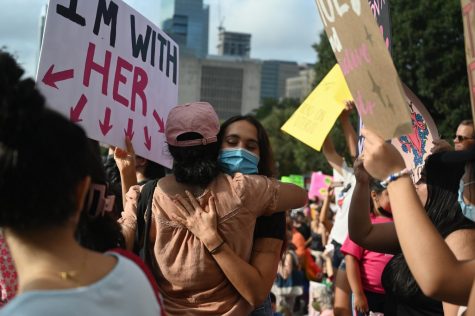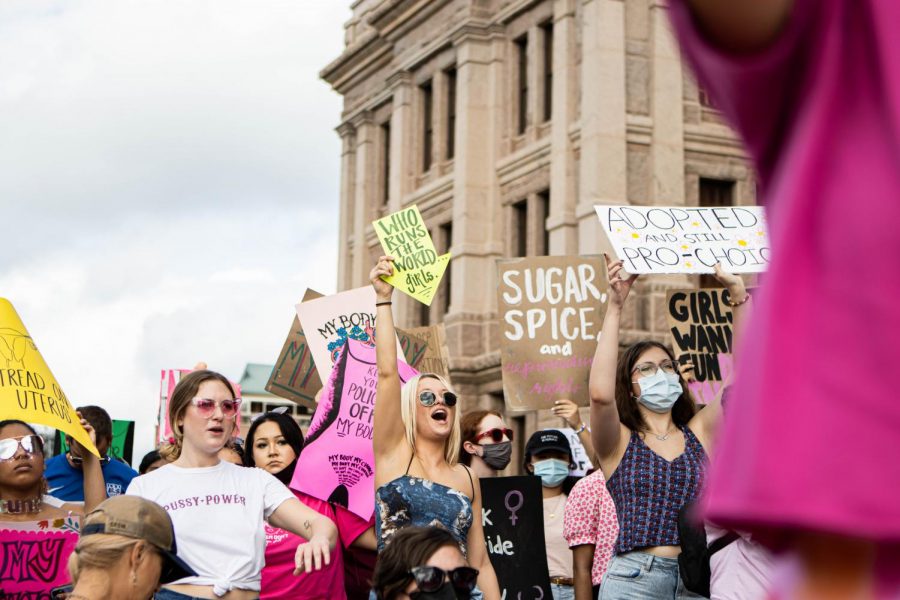Activists around Texas protest restrictive abortion bill
October 8, 2021
Original audio story by Laura Morales.
After decades of advocating for women’s rights, activists are organizing protests and marches to speak out against Senate Bill 8, which effectively outlaws abortions past six weeks of pregnancy.
People from around the country gathered at the Texas Capitol on Oct. 2 to protest the restrictive abortion law that went into effect on Sept. 1. But the fight for women’s rights has marched on for decades. Starting in the 1960s, a group of women at UT Austin banded together, advocating for equal rights, birth control and safe abortions for women. They called themselves the “Women’s Liberation Movement.”
UT Immigration law professor Barbara Hines worked for this group during the 1960s and 1970s and said her time as a women’s rights activist was not easy, often filled with road blocks.

“One of the things I would never forget is one guy got up and said, ‘Well, the reason you are in women’s liberation is because you are all so ugly, and you don’t shave your legs, and you can’t find a boyfriend,’” Hines said.
But Hines didn’t let this push her down. She continued to protest against the objectification of women and at the same time, worked to open a center to help women at UT access birth control more easily.
The group began advocating heavily for birth control because it was much harder to find at the time, said Victoria Foe, another member of the Women’s Liberation Movement.
“Sometimes, the doctors would just lecture the women about how they were terrible human beings, even asking for this,” Foe said. “Or they would make passes at you, because you had clearly declared yourself (promiscuous) by this, you know, it was just a very different climate, but we were just trying to be serious students and have control of these matters.”
Foe said quickly after the rise of birth control, many women came to them seeking access to safe abortions. She worked with Judy Smith, a student who helped found the Women’s Liberation Movement, to help guide these women.
“Desperation is the key word one can use to describe the women,” Foe said. “Judy Smith and I went and interviewed some doctors in Mexico on the border who performed abortions to see if we could find safe medical clinics where, if women went to them, they werent going to be exposed to anesthesiologists who would make them sick or get infections or any of those things.”
At the time, helping women get abortions was outlawed in Texas, Foe said, and while she and the rest of the members were nervous about getting arrested, the center thrived in helping women gain access to birth control and abortions.
In 1973, the U.S. Supreme Court established a precedent of a woman’s right to an abortion in Roe v. Wade’s landmark decision. The case was rooted in Texas and driven forward by those who championed the same causes as the Women’s Liberation Movement.
For almost 50 years, Roe v. Wade protected basic access to abortion in Texas. But when the Supreme Court allowed Senate Bill 8 to go into effect, it created an unprecedented, near-total ban on the procedure.
While the Supreme Court may have to make future decisions related to Senate Bill 8, it’s also considering a case out of Mississippi that directly challenges Roe v. Wade’s protections in December. But advocates like those in the Women’s Liberation Movement hope their hard work all those decades ago will still mean something.
“I had no idea at the time this was going to be historic,” Foe said. “We were just doing what we were doing to fix something that was really broken. If there is something that is really unjust that is going on in society you don’t sit around and wait for somehow the experts to come and fix it. Remember that the world is made better by people who care about things and who work on things.”












